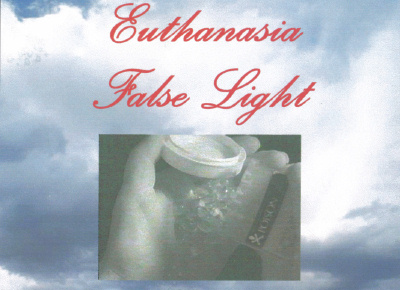Maine’s “Death with Dignity Act” would classify a lethal drug overdose as a medical treatment option. It would permit a doctor to help a patient commit suicide if the patient has a condition that is expected to cause death within six months.
On November 7, 2000, voters in Maine will vote on an assisted suicide initiative called the “Death with Dignity Act.” The assisted suicide proposal is patterned after Oregon’s law permitting assisted suicide.
The Assisted Suicide Initiative does not require that family members be notified when a doctor is going to help a loved one commit suicide.
Family notification is not required, only suggested. [Sec. 5-909] The patient’s family doesn’t need to be notified until after the patient is dead.
The Assisted Suicide Initiative has no safeguards for the patient at the time the drug overdose is taken.
The Assisted Suicide Initiative only covers the time from the patient’s first death request to the moment that the doctor actually writes the prescription for lethal drugs. The drugs could be stored for an indefinite amount of time, with no concern for public safety or patient protection. There are no provisions to insure that the patient is competent at the time the overdose is taken, that the patient is not pressured into taking the drugs, or that the fatal dose was not given to the patient against his or her will.
The Assisted Suicide Initiative would give government health programs, managed care programs and HMOs the opportunity to approve prescriptions for suicide to cut costs.
In Oregon (the only state with a law permitting assisted suicide), Medicaid pays for assisted suicide for poor residents under the category of “comfort care,” and spokes-persons for health insurance plans said assisted suicide “…would be no different than any other covered prescription.” [Oregonian, 2/27/98; Statesman Journal, 12/6/94] The drugs for assisted suicide cost about $35 – far less than medications and treatments to make patients comfortable.
The Assisted Suicide Initiative does not allow anyone to “coerce” or use “undue influence” to obtain a request for assisted suicide. [Sec. 5-920(b)] However, nothing in the Assisted Suicide Initiative prohibits HMOs, insurance companies, health providers, or others from suggesting assisted suicide to a patient or encouraging a patient to request a lethal prescription.
The Assisted Suicide Initiative would permit doctors to help mentally ill or depressed patients commit suicide.
A referral for counseling is for the purpose of determining whether the patient requesting death has a “psychiatric or psychological disorder or depression that causes impaired judgment.” [Sec. 5-907 emphasis added] “Counseling” is defined as “a consultation” between a counselor and the patient. [Sec. 5-902(e)] Even if the counselor determines that the patient is mentally ill or depressed, that patient would still be able to get help to commit suicide as long as the counselor determines that the patient’s judgment is not impaired.
The Assisted Suicide Initiative would permit “shopping” for health professionals who would find that a patient is qualified for assisted suicide.
Even if a patient was found to have “impaired judgement,” the Assisted Suicide Initiative does not prohibit a health provider, family member or other person from arranging for the patient to be evaluated by other counselors until one is found who would declare the patient capable of choosing assisted suicide. This has already occurred in Oregon where it has been noted that “a psychological disorder — senility, for example — does not necessarily disqualify a person.” [Oregonian, 10/17/99]
A woman died of assisted suicide under Oregon’s “Death with Dignity Act,” even though she was suffering from early dementia. Her own physician had declined to provide a lethal prescription for her. When counseling to determine her capacity was sought, a psychiatrist determined that she was not eligible for assisted suicide since she was not explicitly pushing for it and her daughter seemed to be coaching her to do so. She was then taken to a psychologist who determined that she was competent but possibly under the influence of her daughter who was “somewhat coercive.” Finally, she was assessed by a managed care ethicist who determined that she was qualified for assisted suicide, and the lethal dose was prescribed. [Oregonian, 10/17/99]
The Assisted Suicide Initiative would allow drugs for suicide to be mailed to the patient.
Nothing in the Assisted Suicide Initiative requires the patient to obtain the drugs in person. In one reported assisted suicide under the Oregon Death with Dignity Act, the patient received the lethal overdose by Federal Express. [Oregonian, 1/17/99]
The Assisted Suicide Initiative does not insure that abuse or the number of deaths from assisted suicide would ever be known.
As with the Oregon “Death with Dignity Act,” the Assisted Suicide Initiative requires that information on assisted suicide be collected [Sec. 5-915], but there are no penalties for not reporting. Following the first year after the Oregon law went into effect, the Oregon Health Division (OHD) which is responsible for collecting the required information, issued a report stating that “it is difficult, if not impossible, to detect accurately and comment on underreporting.” [NEJM 2/18/99, 583]
And since whatever is reported comes from the very doctors who prescribe the lethal doses, the information may be fabricated. According to the OHD, “For that matter, the entire account could have been a cock and bull story. We assume, however, that physicians were their usual careful and accurate selves.” [OHD, CD Summary, vol. 48, no. 6, 3/16/99; emphasis added.]
Supporters of the Assisted Suicide Initiative claim it would offer a choice to people who want it. But it would actually victimize minorities, people with disabilities, and poor people.
“Choice” is an appealing word, but inequity in health care is a harsh reality. As disability rights activist Diane Coleman has observed, “Assisted suicide is primarily promoted by those who are ‘white, well-off, worried and well.’”
Studies have shown that minorities, women, the elderly, the disabled and the uninsured often do not receive the same level of medical care as other members of society.
IF ASSISTED SUICIDE IS LEGALIZED IN MAINE, IT COULD BECOME THE ONLY TYPE OF “MEDICAL TREATMENT” TO WHICH MANY PEOPLE WOULD HAVE EQUAL ACCESS. THE LAST TO RECEIVE HEALTH CARE COULD BE THE FIRST TO RECEIVE ASSISTED SUICIDE.




